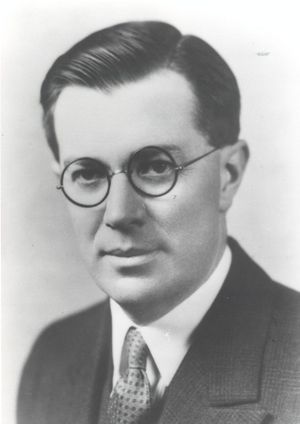Frederick Terman and Eta Kappa Nu
The honorary society Eta Kappa Nu was formed at the University of Illinois in 1904. Its principal objective is to encourage excellence in electrical and computer engineering, and it conducts programs that reward leadership and good citizenship at both the student level and among alumni. Student chapters undertake numerous projects, including tutoring of fellow students and student participation in Engineers Week in the form of technical demonstrations and exhibits. Eta Kappa Nu recognizes outstanding accomplishments of electrical and computer engineering students, faculty, and career engineers and engineering managers, irrespective of their membership in Eta Kappa Nu. In recent years it has set a goal of developing programs and services in cooperation with the IEEE that can be of mutual benefit. Students, both undergraduate and graduate, are invited and elected by a college chapter based primarily on superior scholarship. Career engineers may also be elected for "meritorious work in the profession and allied pursuits".
Eta Kappa Nu celebrated its 100th anniversary in 2004. During its first century some 120 electrical and computer engineering leaders were elected to its highest grade: Eminent Member. Among the Eminent Members are corporate executives and company founders William Hewlett and Simon Ramo, leaders in government Vannevar Bush and Jerome B. Wiesner, Nobel Prize winners Jack Kilby and Charles Townes, IEEE medal winners and past presidents Ivan Getting and Donald Fink, educators Ernst Weber and Mischa Schwartz, and inventors Lee de Forest and John Bardeen. An Eminent Member who illustrates particularly well engineering excellence and service to the professional community is Frederick Terman.
Terman, born 7 June 1900 in English, Indiana, studied under Vannevar Bush at MIT before beginning in 1925 his lifelong teaching career at Stanford University. His research into radio circuits and his publications helped establish the academic field of electronics. In 1932 he published Radio Engineering, an advanced text that taught how to calculate the performance of radio circuits "with the same certainty and accuracy that the performance of other types of electrical equipment, such as transformers, motors, and transmission lines, is analyzed." The textbook was adopted by universities in many countries (in the English version and several translations) and went through four editions, the last in 1955. Two other highly influential books by Terman were Measurements in Radio Engineering (1935) and Radio Engineers' Handbook (1943).
Terman always sought a close collaboration between university and industry, insuring that the design information he presented in textbooks accorded with current practice and fostering ties between the Stanford EE program and local industry. For these latter efforts, he is often called the father of Silicon Valley. Besides being an Eta Kappa Nu Eminent Member, he received the National Medal of Science and the Medal of Honor of the Institute of Radio Engineers. Terman died on 19 December 1982 in Palo Alto.

